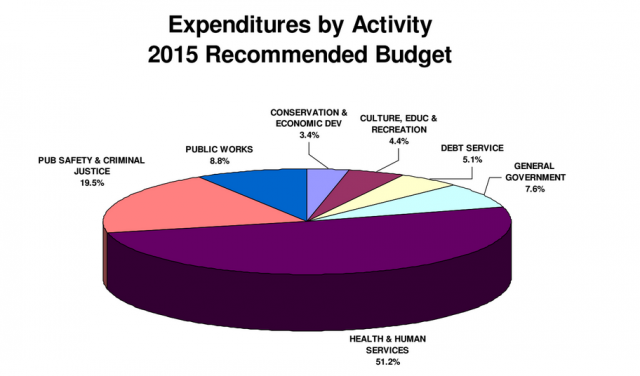






 Carousel BayrdThe Dane County Board adopted the 2015 county budget on Nov. 17, capping a process that included three public hearings and approximately 10 committee meetings since Sept. 1.
Carousel BayrdThe Dane County Board adopted the 2015 county budget on Nov. 17, capping a process that included three public hearings and approximately 10 committee meetings since Sept. 1.
The operating budget is $530 million. Taxes on the average Madison home will increase $23.14, from $717.98 last year to $741.12 this year.
More than half the budget (51 percent) will be spent on human and social services, a broad category that encompasses county funding for programs for senior citizens, people with disabilities, youth, at-risk populations, medical services and more. Some 20 percent goes to public safety. County public safety funds support the sheriff’s department including the county jail, the courthouse, the district attorney’s office, juvenile court and detention, family court, emergency management, the 911 center, and the medical examiner’s office.
Under state-imposed taxing limits, this is the maximum the county board can assess. The result is forcing the county board to make budget cuts to human services, increase health care costs for employees without offsetting the costs with any pay increase, and assess increased fees for some county services.
The budget also includes capital funding. Capital projects are not included under the levy limit, and they allow the county to pursue infrastructure or projects not tied to personnel or operating a program. Capital costs include purchasing and maintaining county facilities such as the jail, parkland, landfill and employee offices; equipment purchases; and improvments to land, the environment and roads.
LISTEN: On WORT’s “A Public Affair” Carousel Bayrd interviews Madison City Council President Chris Schmidt and Madison City Council President Pro-Tem Denise Demarb and then Dane County Board Personnel and Finance Chair Jeff Pertl about the budget processes for each.
Here are some of the highlights in the county’s 2015 budget:
HUMAN SERVICES
Affordable housing: The county is devoting $8 million in capital funds, $2 million each year for four years, to create an Affordable Housing Development Fund. It includes collaborating with Madison and private donors to build approximately 40 efficiency units in downtown Madison and at least as many family housing units. The $2 million annually also includes developing cooperative housing for young adults at risk of homelessness, providing them with housing and wrap-around services to support their success.
Homelessness: The county will continue to fund a permanent day center to shelter individuals from the cold weather. However, since the day center has not been developed yet due to zoning challenges, one-time funds of $50,000 are being awarded to Bethel Lutheran Church to provide daytime services for homeless individuals during the winter months. An additional $35,000 was added to $60,000 already budgeted to open the county’s only homeless youth shelter, which was constructed last year in part with county funding. Unfortunately, even with this financial support, the youth shelter still does not have enough funds to open yet. The hope is to garner additional private dollars to open by next summer.
Individuals with developmental disabilities: There is good news and bad news. The county increased this essential funding by $2.5 million to eliminate waiting lists and ensure services to all individuals needing assistance. However, even with the $2.5 million, the growing number of people needing these services is so great that the individual services each client gets will be decreased. This scenario has played out continuously in Dane County over the past decade — our commitment to the quantity of services leaves the quality of individual services in decline. Dane County services are still superior to those in other counties (and as a result individuals with developmental disabilities often relocate to Dane County), but that may not continue for much longer, as this formula is not sustainable.
 2015 Dane County budget breakdown
2015 Dane County budget breakdown
Youth services: The county is continuing its commitment to fund Mental Health Crisis Intervention Teams in Madison, Verona, and Sun Prairie schools. This pilot program just began in the fall of 2014. The county is also continuing to fund Early Childhood Zones, in collaboration with public schools in Madison and Sun Prairie, to support school success through case management for struggling families with school-aged children.
PUBLIC SAFETY
911 staffing: With growing county population, the county will add eight pre-hires to the 911 Communications Center. The pre-hires allow training of up to eight additional individuals, beyond positions available, to ensure coverage during overtime needs and seamless service in anticipations of retirement and turnover.
Dane com radio communications: An additional $4 million in capital funds will strengthen the radio frequency power of our police, fire, and EMS first responders, allowing them to better communicate during emergency situations.
Mental health and the jail: The county board has committed to prioritize studying how to improve mental health options for individuals inside and outside the jail, including improving general services, providing alternatives to jail for police officers needing to remove an individual for safety concerns, and improving the jail facility itself to better address the mental health needs of inmates.
Pre-trial assessment: Part of the racial disparities in the criminal justice system includes the disproportionate incarcerations of racial minorities before any criminal convictions simply because the individual cannot afford bail. In response, the county will develop an assessment tool to objectively assess pre-trial placement decisions and eliminate racial biases from the decision process.
ENVIRONMENT
Protecting our lakes: Clean lakes remain a county budget priority, with $500,000 in capitol funds to keep farm manure run-off out of the lakes and $1 million to upgrade urban stormwater systems that stop sediment from entering our waterways.
Climate change preparation: After several years of extreme weather conditions, it’s no longer an exception that the county faces a weather event that impacts our environment—from excess rain and flooding, to tornados, to blizzards. The county is investing in updated weather technology to ensure we are better prepared for upcoming emergency events.
Compressed natural gas and our incredible landfill: The county landfill is a national pioneer. The landfill creates gas that is 50 percent methane and 40 percent carbon dioxide. The methane is already being put to use—as fuel for the county’s compressed natural gas snowplows fleet (which increases to 12), and as energy that is put back on the grid. A new pilot project investigate how to convert the carbon dioxide emissions into electricity too.
--Carousel Bayrd is Vice Chair of the Dane County Board and hosts "A Public Affair" Tuesdays at noon on WORT (89.9 FM). She lives in Madison with her husband and two children.
|
|
|
Welcome to the Madison Commons, a website designed to provide news and information about all of Madison's neighborhoods and a crossroads for the discussion of community issues. The name comes from the idea of a village commons, a place for news, talk, debate, and some entertainment, too, that's open to everyone.
All rights reserved. Read more about the Madison Commons and its partners.

